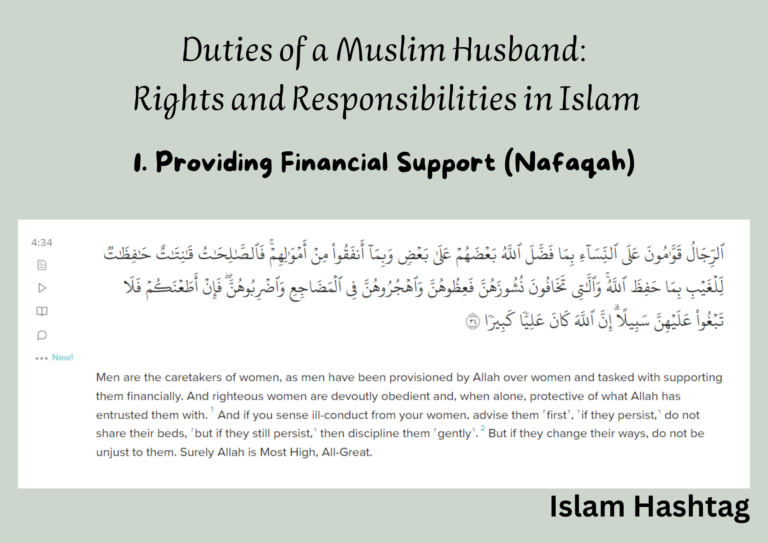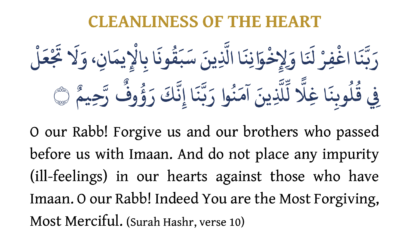Duties of a Muslim Husband: Rights and Responsibilities in Islam
In Islam, marriage is considered a sacred bond between a husband and wife, designed to provide peace, love, and companionship. The relationship is built upon mutual rights and responsibilities. A Muslim husband has a critical role to play in maintaining harmony and fulfilling the obligations entrusted to him by Allah. Understanding the duties of a Muslim husband is essential for the wellbeing of both the family and the community. This article will provide an in-depth explanation of the responsibilities, exploring the rights of the Muslim wife, the husband’s role, and his responsibilities in Islam.
1. Providing Financial Support (Nafaqah)
One of the most important duties of a Muslim husband is providing for his wife’s financial needs. This duty is not dependent on the wife’s wealth or income, but rather is obligatory upon the husband.
“Men are the protectors and maintainers of women because Allah has given the one more (strength) than the other, and because they support them from their means.”
(Surah An-Nisa, 4:34)My non-Tech Mom loves this Digital Tasbih because her counts are never lost. Alhumdulillah, Now she spends close to Four hours in dhikr everyday. Would you like to build your dhikr habit too? It’s completely free.
In Islam, a husband is responsible for ensuring that his wife has adequate food, clothing, shelter, and other essentials. This is referred to as Nafaqah, which means the financial obligation of the husband. It is a significant part of the husband’s responsibility to his wife in Islam, and failing to meet this responsibility without valid reason is considered sinful.
2. Treating the Wife with Kindness and Compassion
Another key responsibility of a Muslim husband is to treat his wife with kindness and compassion. The Prophet Muhammad (Rasul Allah Sallallahu Alaihi wa Sallam) emphasized this when he said:
“The best of you is the one who is best to his wife.” (Hadith, Tirmidhi)
In Islam, the relationship between husband and wife is meant to be one of love, mercy, and mutual respect. The Muslim husband’s responsibilities extend beyond merely providing material support; they also involve emotional support, care, and companionship. A husband must be gentle, understanding, and considerate of his wife’s feelings and needs.
3. Fulfilling the Wife’s Rights
A fundamental aspect of husband responsibilities to wife in Islam is fulfilling the wife’s rights. These include:
- Right to Mahr (Dowry): Mahr is a mandatory gift from the husband to the wife, usually given at the time of marriage. It symbolizes the husband’s commitment and willingness to fulfill his obligations.
“And give the women (on marriage) their dower as a free gift.” (Surah An-Nisa, 4:4)
- Right to Maintenance (Nafaqah): As mentioned, the husband is responsible for the wife’s financial support. This includes food, clothing, and shelter, based on his means and her reasonable needs.
- Right to Kind Treatment: A husband must treat his wife with kindness, respect, and dignity. Abuse, neglect, or any form of harm is forbidden in Islam.
- Right to Privacy: Islam stresses the importance of respecting a wife’s privacy. The husband must not disclose intimate details about his wife to others.
4. Maintaining Justice in Case of Multiple Wives
Islam allows a man to have up to four wives, but only under strict conditions. If a husband chooses to take more than one wife, he is required to treat all his wives justly and equally.
“But if you fear that you will not be just, then (marry only) one…”(Surah An-Nisa, 4:3)
Sometimes a short pause to remember Allah brings clarity and steadiness back into our day. These reflections are simple reminders from my own journey.
The role of a husband in Islam in the case of multiple wives includes providing each wife with separate accommodation and ensuring that all wives receive equal financial and emotional support. This is a significant responsibility, and any failure to be just is considered a sin.
5. Protecting the Wife’s Honor and Dignity
In Islam, the husband is the protector of his wife’s honor and dignity. He must safeguard her from harm, whether physical, emotional, or social. It is the duty of a Muslim husband to ensure that his wife’s reputation is protected and that she feels secure in their marriage.
The husband must also avoid speaking ill of his wife or exposing her flaws to others. The Prophet (Rasul Allah Sallallahu Alaihi wa Sallam) said:
“A Muslim is the brother of a Muslim. He should not oppress him, nor should he hand him over to an oppressor. Whoever fulfills the needs of his brother, Allah will fulfill his needs…”
(Hadith, Bukhari and Muslim)
6. Encouraging the Wife’s Spiritual Growth
One of the less emphasized but equally important Islamic husband duties is encouraging his wife’s spiritual development. Islam encourages men to guide their wives towards good deeds and remind them of their religious duties. A husband must ensure that his wife has the opportunity to worship, learn about Islam, and perform her religious obligations.
“O you who have believed, protect yourselves and your families from a Fire whose fuel is people and stones…”
(Surah At-Tahrim, 66:6)
This includes teaching his wife about her Islamic obligations, encouraging her to pray, and supporting her in religious studies. In this way, the husband acts as both a companion and a spiritual leader in the household.
7. Mutual Consultation and Decision Making
In a harmonious marriage, decisions should not be made unilaterally. Islam encourages mutual consultation between husband and wife on family matters. The duties of a Muslim husband include taking his wife’s opinions and feelings into consideration when making important decisions. Consultation is sunnah.
“…And consult them in the affairs. Then when you have taken a decision, put your trust in Allah.”
(Surah Aal-E-Imran, 3:159)
Mutual consultation helps foster a sense of teamwork and mutual respect in the marriage.
8. Providing Emotional Support
A husband’s responsibilities go beyond physical and financial support. The Prophet Muhammad (Rasul Allah Sallallahu Alaihi wa Sallam) was known for his tenderness and affection toward his wives. Emotional support is a crucial aspect of a healthy marriage. A Muslim husband should provide comfort to his wife in times of difficulty and be her source of strength and encouragement.
The Prophet (Rasul Allah Sallallahu Alaihi wa Sallam) said:
“Whatever you spend with the intention of seeking Allah’s pleasure will be rewarded. Even the morsel of food which you feed your wife.”
(Hadith, Bukhari and Muslim)
This highlights the importance of love, compassion, and emotional care in a marriage.
9. Being Patient and Forgiving
Patience is a key virtue in Islam, especially within marriage. The Prophet Muhammad (Rasul Allah Sallallahu Alaihi wa Sallam) demonstrated great patience with his wives, and a Muslim husband is expected to do the same. Human beings are imperfect, and misunderstandings are inevitable in marriage. A husband should exercise patience and forgiveness in such instances, rather than reacting with anger or harshness.
“And live with them in kindness. For if you dislike them—perhaps you dislike something through which Allah brings much good.”
(Surah An-Nisa, 4:19)
This verse reminds husbands to be patient and kind, even when difficulties arise in the marriage.
10. Respecting the Wife’s Personal Rights and Boundaries
Every individual in a marriage has personal rights and boundaries that must be respected. A husband must respect his wife’s personal space, opinions, and preferences. While the husband is the leader of the household, Islam emphasizes mutual respect and dignity.
A Muslim husband should not impose his will on his wife or force her to do things against her will. Islam encourages gentle persuasion and dialogue, not coercion.
11. Balancing Time Between Work and Family
Many Muslim husbands bear the responsibility of earning a living for their families. However, this should not come at the cost of neglecting family life. The role of a husband in Islam includes balancing work with time spent with his wife and children. The Prophet (Rasul Allah Sallallahu Alaihi wa Sallam) provided the best example by ensuring that he fulfilled his duties to his family, despite his many responsibilities.
A Muslim husband should strive to spend quality time with his family, help his wife with household chores, and be actively involved in raising the children.
Conclusion
The duties of a Muslim husband are vast and encompass every aspect of life, from providing financial support to being a source of emotional strength and spiritual guidance. A marriage in Islam is based on mutual respect, love, and compassion, and a Muslim husband must fulfill his responsibilities to ensure the well-being and happiness of his wife. By fulfilling these responsibilities, a Muslim husband not only strengthens his marriage but also gains the pleasure of Allah.
Join our Tafsir and Hadith Courses Follow us in Facebook for Daily Hadith
Discover more from Islam Hashtag
Subscribe to get the latest posts sent to your email.







